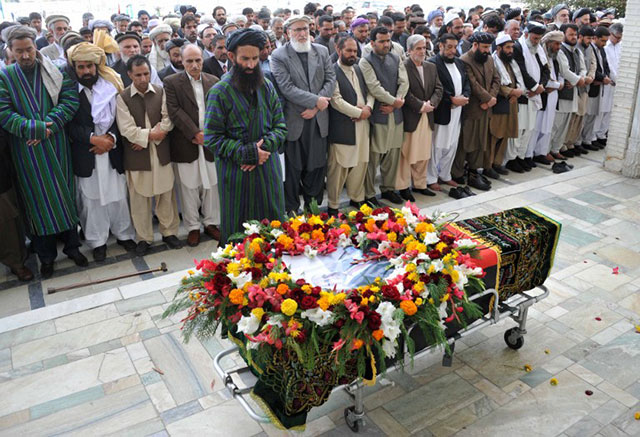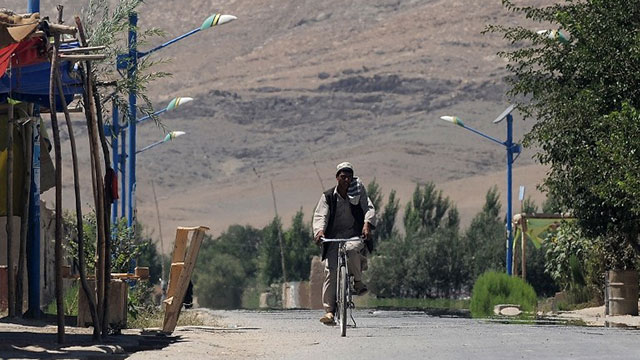SUMMARY
This is AI generated summarization, which may have errors. For context, always refer to the full article.
The feast of Eid-al-Adha was being celebrated when the governor of the war-torn Afghan province of Logar was killed early in the morning of October 15 by a bomb planted inside the Qur’an while he was giving his Eid greeting inside the main provincial mosque.
The explosion literally took off his head clean from his neck. The blast was powerful enough to kill several others, and wounded scores more.
The symbolism of the tragedy has not been lost in me. Eid-al-Adha is the Islamic feast of the sacrifice, commemorating Abraham’s absolute submission to God’s will when he offered his son Isaac. Indeed, no word could ever capture the day’s tragedy more than that.

I just visited Pul-i-Alam, the provincial capital, exactly a week earlier, and I knew the moment I stepped into Logar that there was a quiet sinister hidden behind its picturesque vignettes. My team was actually planning to meet with the governor that day, but we decided to leave early due to security considerations.
It’s been almost 3 months since I arrived in Afghanistan for a mission that many think as quixotic and foolhardy. I am a part of an international organization engaged in political rebuilding.
Only a few willingly submit to a fate as uncertain as the one I put myself into. Call it pride, call it naiveté. Call it what you want. But deep inside, I know that world history is being forged in the dust bowls of the Afghan landscape.
I cannot just pass up the opportunity to be part of the wanderlust-stricken men who want to dig and strike while the iron is still hot.
Some say the political system in Afghanistan is so devastatingly torn by the curse of perpetual war that it would take God another attempt at creation to fix things in this landlocked country. This place has not known peace for a very long time. Good fortune and prosperity even longer.
But there is always excitement in the air especially in the Afghan capital, Kabul. One can feel in the people a hurried eagerness to build. To grow. To get rich. To get ahead. To get moving forward. To live.
Cycle of violence
For so long, this country has been stuck in a seemingly unending stasis of violence, abject poverty and factionalism. But little by little, gains are beginning to be seen. Hospitals are built. Commerce alive. Children schooled. Women working. And life in Afghanistan simply vibrating with youthful gusto.

Now, people are getting ready once again to vote in their presidential election in April 2014, the country’s third since 2001.
For many, there is no expectation of immediate national reconciliation any time soon. The world expects violence – and lots of it – as the poll draws near not only because the election will be happening against the backdrop of an intractable insurgency, but also because democratic transition, especially when flawed, is always a threat to the established order that has seemingly adapted and benefited from the continuation of armed conflict.
The election will not be a cure-all panacea, but it is a step in the right direction toward political normalization.
It is quite interesting to note that in many developed countries, people tend to forget the value of their political choices. Increasingly, there has been a growing trend of questioning the electoral foundation of democratic governance.
But when one spends time in Afghanistan, especially in rural villages, where would-be voters literally dodge bullets and explosive devices just to register, one begins to appreciate the true value of the ballot.
On my way back from Logar, our convoy passed by a burqa-covered woman begging for alms, while carrying an infant. The child reminded me of my newborn daughter back home in Manila. The woman stood in the middle of the road near a big pothole, an unmistakable sign that the road we were on was the site of a recent roadside bombing.
This ghost-like apparition defiantly under the midday sun sums up the fortunes of this tragic country: in need of immediate assistance and always in mortal danger. One does not need to stop and give her alms. Not only will you put yourself in danger, she’ll also keep on coming to the middle of the road and put herself and her child at risk.
What needs to be done is to give her the opportunity as well as options to sustain herself with dignity. She may not find prosperity during her lifetime, but given the right opportunity, her child will be given the fighting chance to survive and develop. – Rappler.com
Hank Paz is a pseudonym of a Filipino humanitarian worker based in Afghanistan who works on political and security issues. He was also previously stationed in the Middle East, Africa and Southeast Asia. He is excited to see his daughter Annika when he gets back home to Manila.
Add a comment
How does this make you feel?
There are no comments yet. Add your comment to start the conversation.